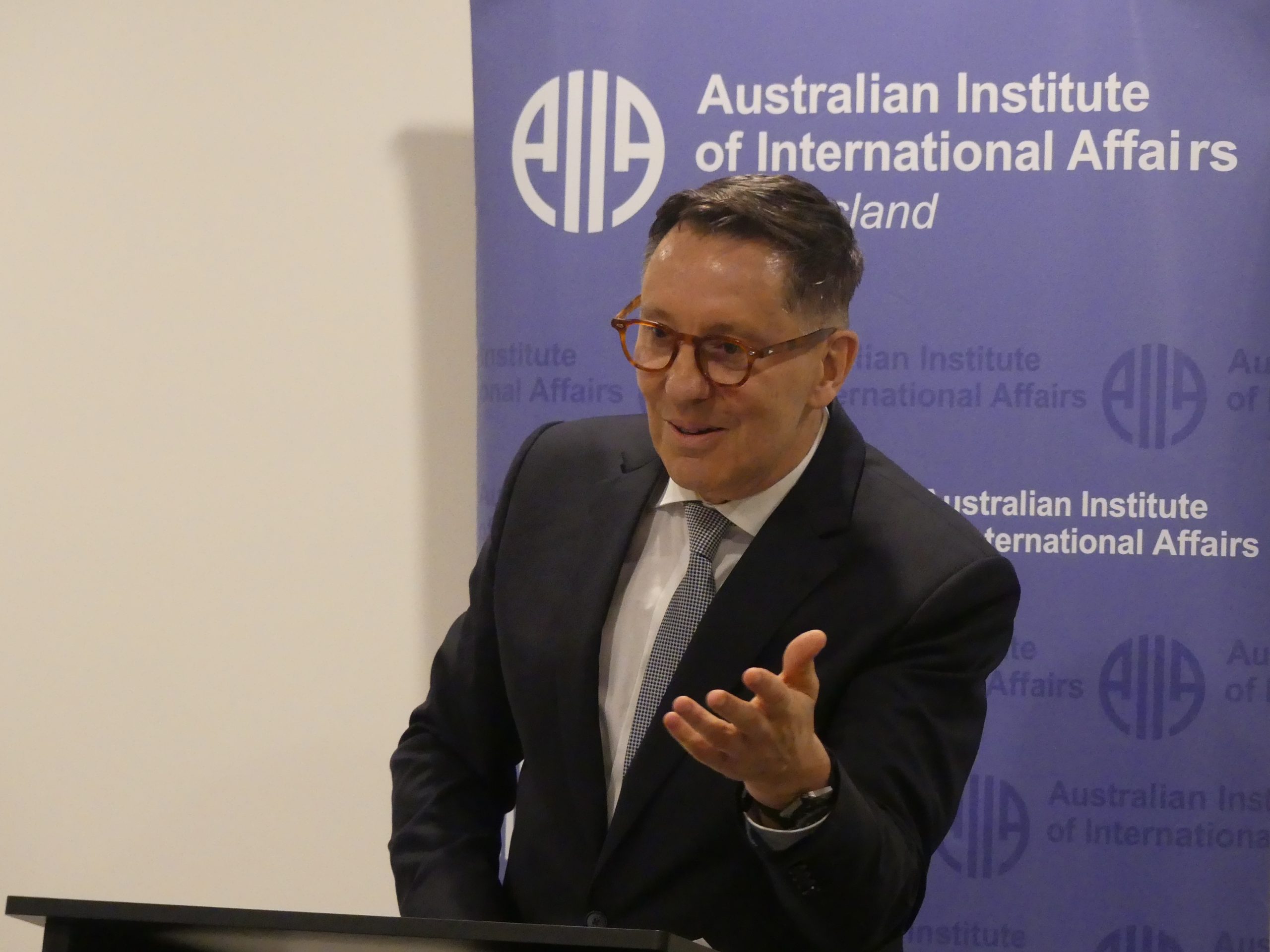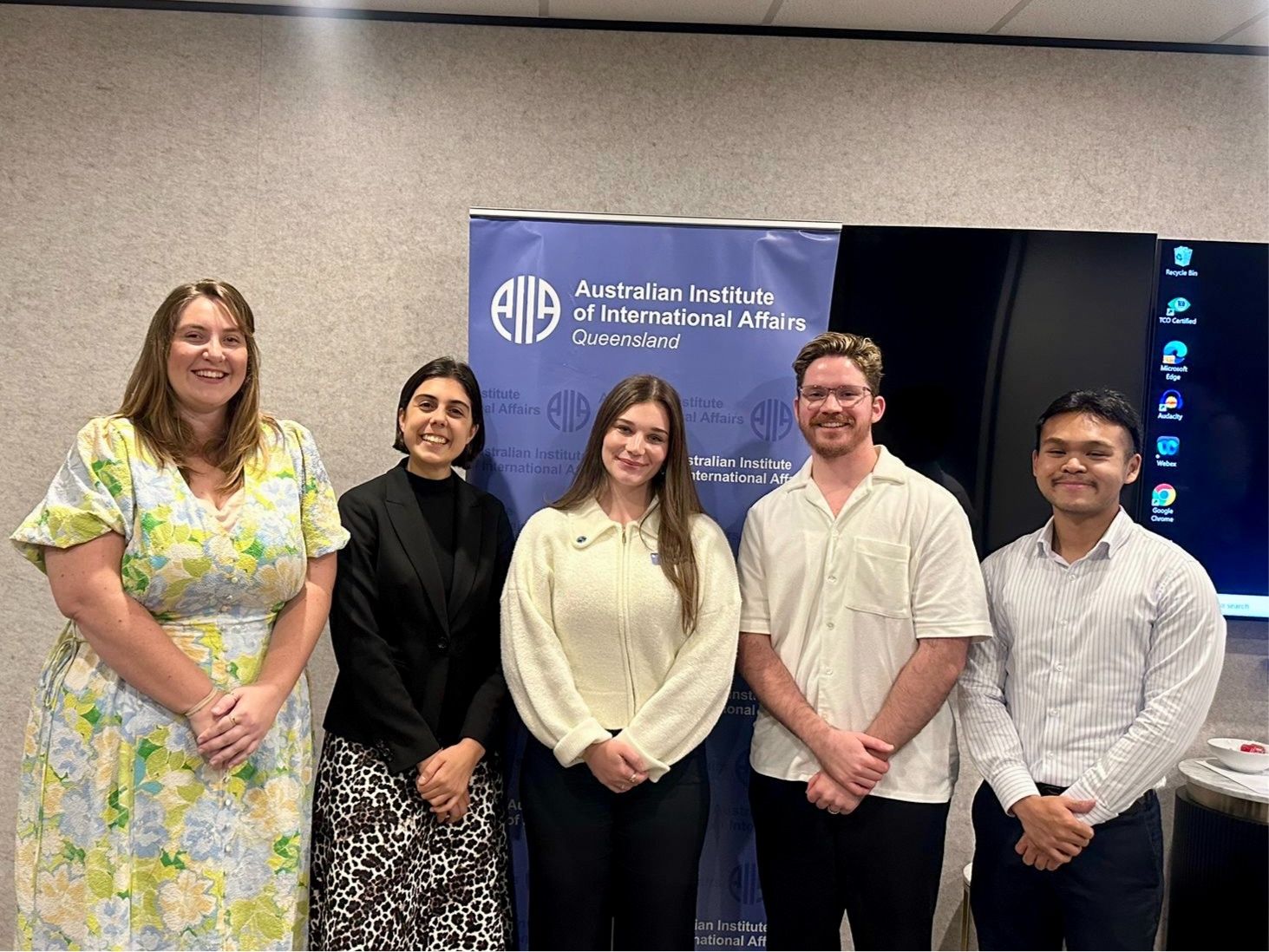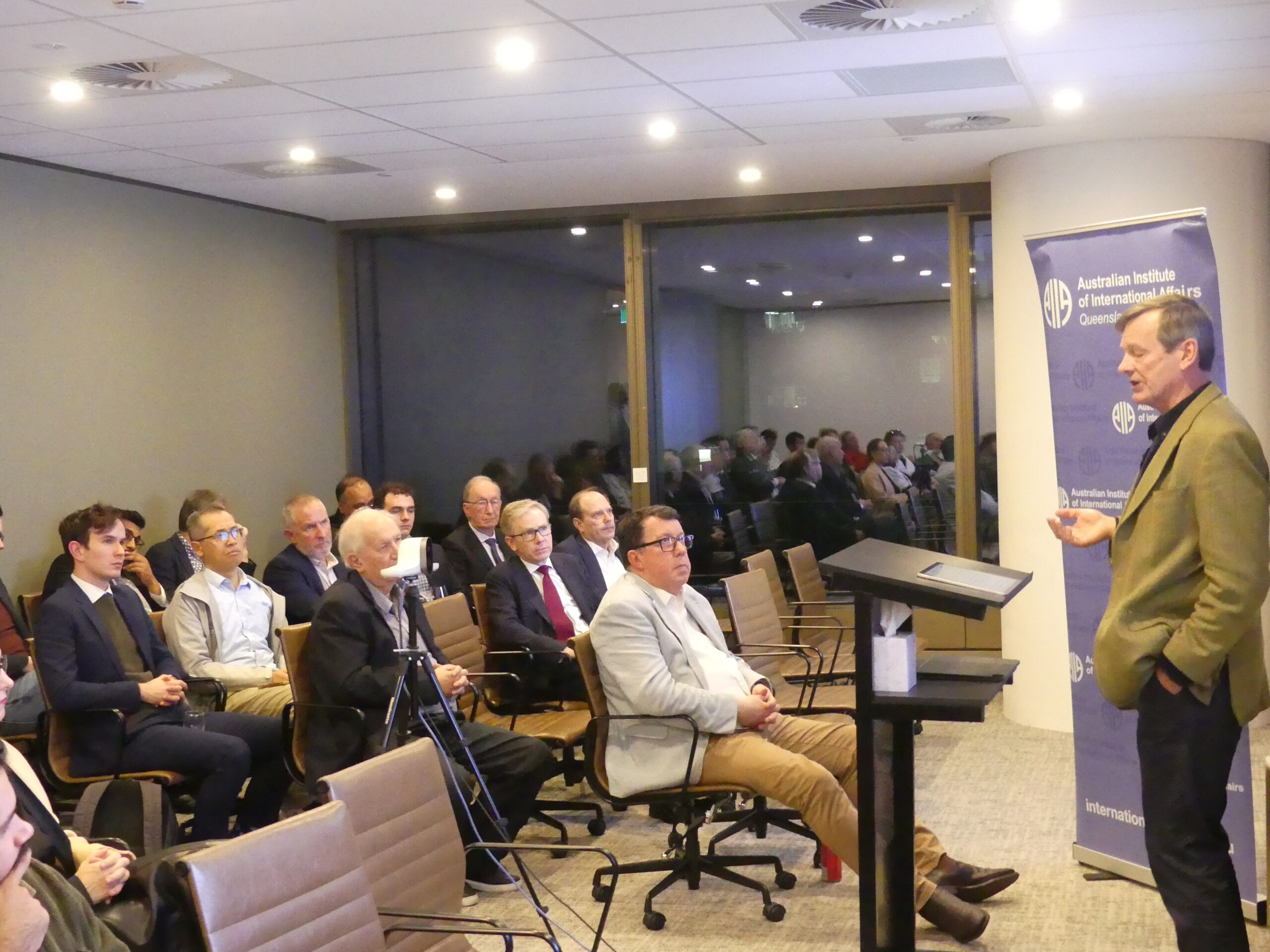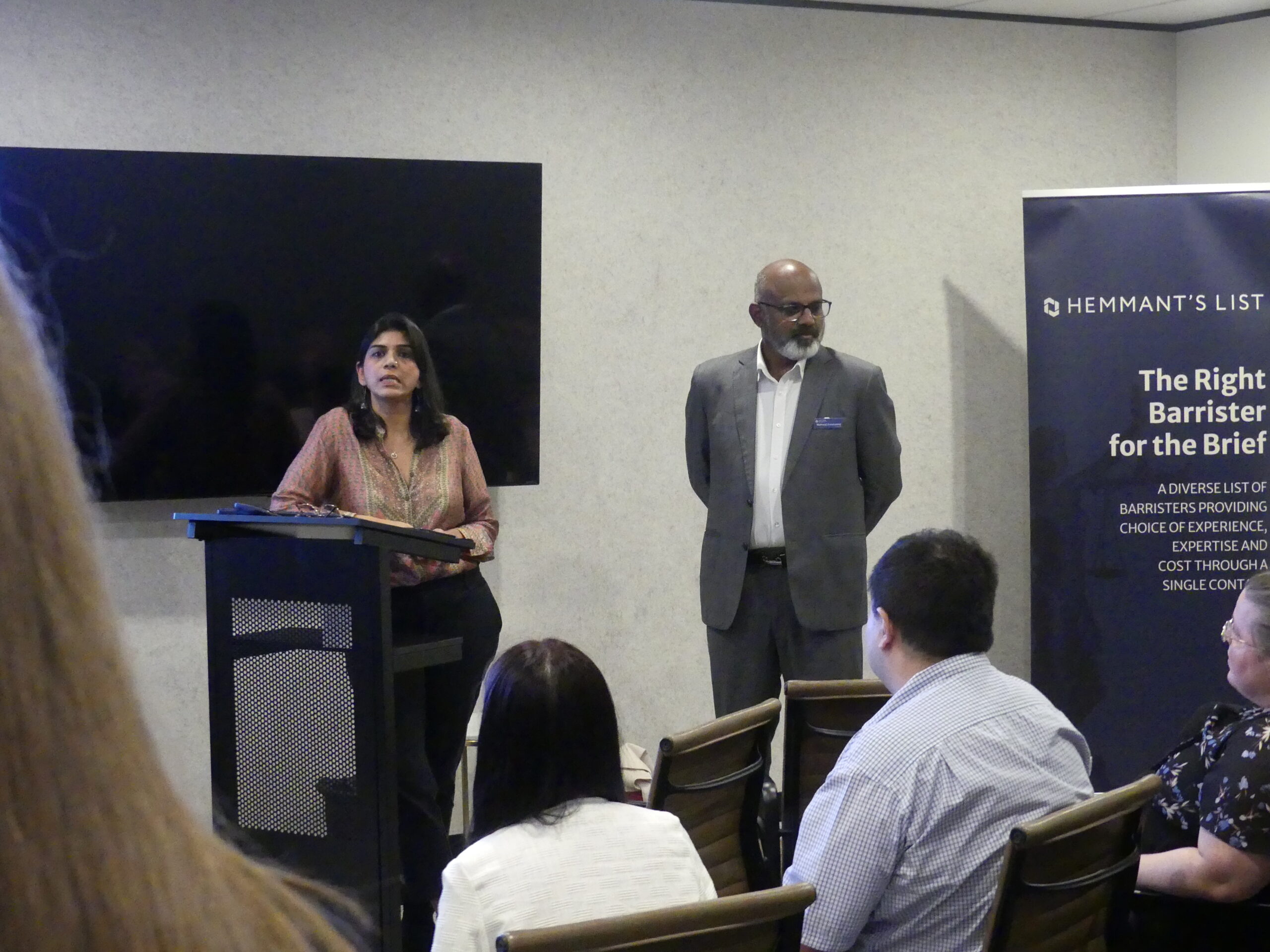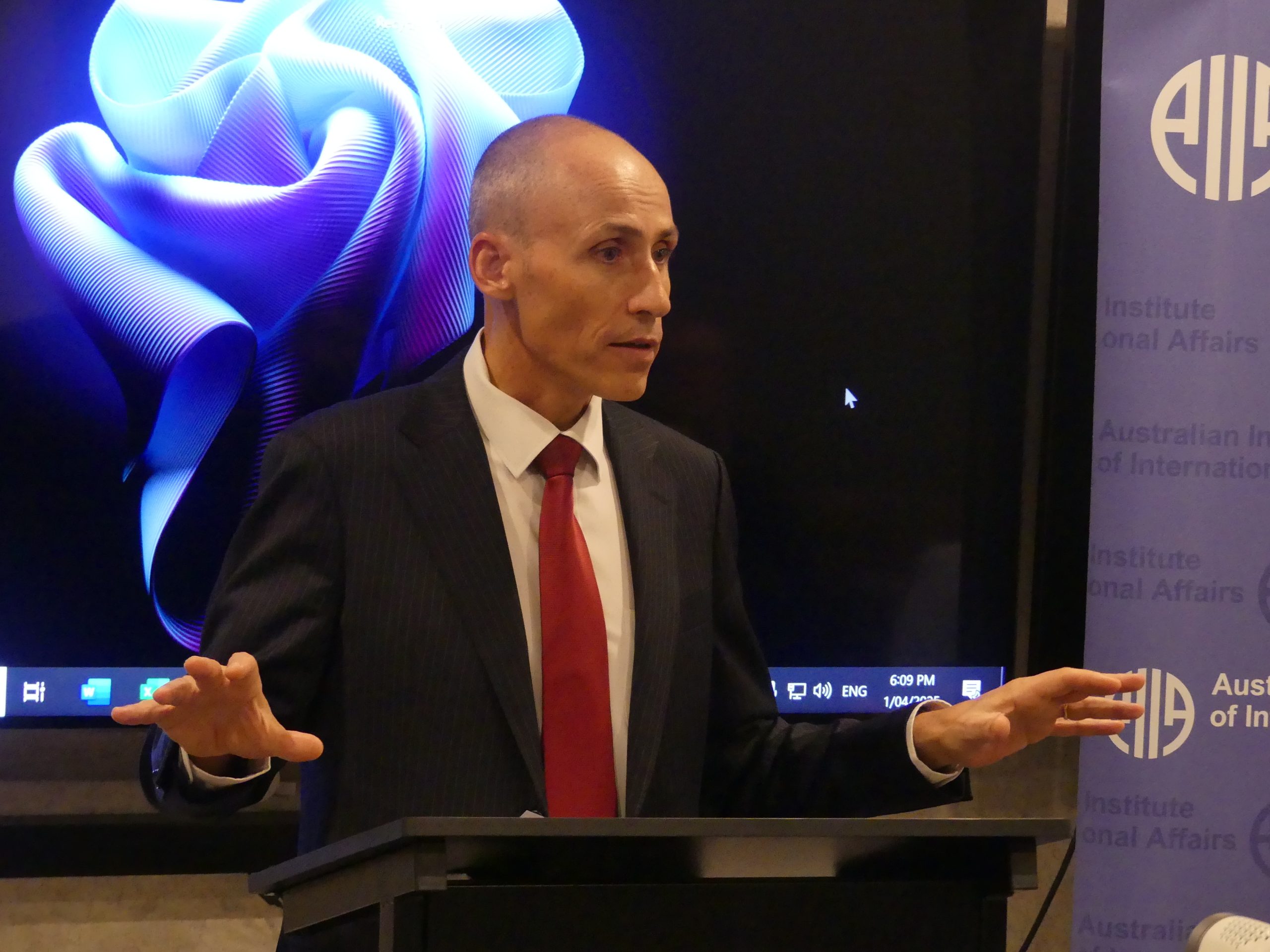The intersection of politics, diplomacy, and national representation has long provoked debate, especially over appointing former politicians to ambassadorial roles. Addressing this contentious topic with disarming candour and analytical depth, the Honourable Dr Brett Mason, former Australian Ambassador to the Netherlands (2015–2018) and Senator for Queensland (1999–2015), provided a nuanced and personal exploration at a recent Australian Institute of International Affairs Queensland (AIIAQ) event.
Dr Mason challenged the prevailing scepticism about politicians serving as diplomats. While readily acknowledging the fundamental differences in training, temperament, and professional ethos between career diplomats and politicians, he argued that, under the right circumstances, politicians can serve as highly effective representatives of Australia’s interests abroad. His address was grounded in personal experience, historical reflection, and an acute awareness of the responsibilities of diplomatic service.
Dr Mason recounted how political circumstances unexpectedly propelled him into diplomacy. Far from being a calculated career move, his appointment to The Hague arose from internal political machinations that disrupted his parliamentary trajectory. Recounting his support for Tony Abbott’s leadership and the factional compromises that led to his departure from Parliament, Dr Mason underscored the profoundly personal and unpredictable nature of political life.
Yet, despite the political origins of his appointment, Dr Mason approached his ambassadorial role with profound seriousness and a commitment to public service. While maintaining Australia’s crucial bilateral relationship with the Netherlands, much of his time was devoted to working with international institutions such as the Organisation for the Prohibition of Chemical Weapons (OPCW), the International Court of Justice, the Permanent Court of Arbitration, and Europol.
Importantly, Dr Mason highlighted the strategic advantages political appointments can bring. Former politicians, particularly those who have served in ministerial or senior parliamentary roles, often have direct access to prime ministers, foreign ministers, and key decision-makers domestically and internationally. Such access allows them to advocate Australia’s interests more swiftly and persuasively, particularly in moments of crisis.
In the wake of the MH17 tragedy, which profoundly reshaped Australian-Dutch relations, Dr Mason’s appointment carried political weight, signalling Australia’s full commitment to seeking justice for the victims and strengthening cooperation with the Netherlands.
On 17 July 2014, Malaysia Airlines Flight MH17 was shot down over eastern Ukraine, tragically killing all 298 people on board, including 38 Australian citizens and residents. The incident, attributed to a surface-to-air missile launched from pro-Russian separatist territory, triggered international outrage and prompted a major multinational investigation centred in The Hague.
During his tenure, Dr Mason played an important diplomatic role in facilitating close collaboration between the Australian Federal Police and Dutch authorities during the MH17 investigation. He also worked to reinforce Australia’s voice in key multilateral legal forums based in The Hague, such as the International Criminal Court and the Permanent Court of Arbitration, strengthening Australia’s push for accountability.
His position further enabled him to facilitate high-level visits, including the 2016 state visit of Their Majesties King Willem-Alexander and Queen Máxima to Australia, symbolically highlighting the rejuvenated ties between the two nations. Dr Mason advanced Australia’s strategic objectives through visible and substantive engagement and strengthened its standing at a sensitive and pivotal moment in international relations.
Nonetheless, Dr Mason confronted criticisms of political appointments head-on. Unlike the often-combative arena of domestic politics, he acknowledged that diplomacy demands distinct qualities—tact, patience, modesty, and an acute sensitivity to nuance. While politicians excel in visibility, advocacy, and rapid decision-making, diplomacy requires building long-term relationships based on trust, discretion, and subtle negotiation. Through years of specialised training and experience, career diplomats develop a deep expertise in protocol, international law, and the intricate conventions of statecraft. Dr Mason conceded that these skills are not easily replicated and must not be underestimated.
Drawing from his own experience, Dr Mason emphasised the indispensable role of professional diplomatic staff in ensuring the success of politically appointed ambassadors. He credited the competent team at the Australian Embassy in The Hague, whose expertise and dedication were crucial to the mission’s achievements. In this light, he acknowledged the legitimate concerns within the Department of Foreign Affairs and Trade (DFAT) about political appointments potentially displacing career officers, advocating for careful consideration and moderation in such decisions.
Dr Mason proposed a balanced approach, suggesting that political appointments should remain the exception, not the rule, and suitability should be assessed rigorously on a case-by-case basis. He argued that when carefully selected and supported by strong diplomatic teams, political appointees could significantly enhance Australia’s global engagement by leveraging their leadership, strategic communication skills, and political acumen.
In a broader reflection, Dr Mason observed that diplomacy, like politics, is a deeply personal endeavour. Success in either realm depends not solely on one’s professional background but on individual character, adaptability, and an unwavering commitment to the national interest. For Dr Mason, success in diplomacy, like in politics, ultimately rests on character.
“Diplomacy is personal, and so is politics.”
In conclusion, Dr Mason’s address offered a rare and thoughtful reflection on the nexus of politics and diplomacy. Ultimately, Australia’s effective representation abroad depends less on titles than on the integrity, judgment, and dedication of those who serve.
Edited by Deborah Bouchez
Written by Kiseki Fujisawa
Currently, in her final year of a Juris Doctor at Griffith University, Kiseki Fujisawa is passionate about international law and global affairs. With a strong interest in the intersection of law and diplomacy, Kiseki aspires to promote justice and peace worldwide through legal and diplomatic efforts.
